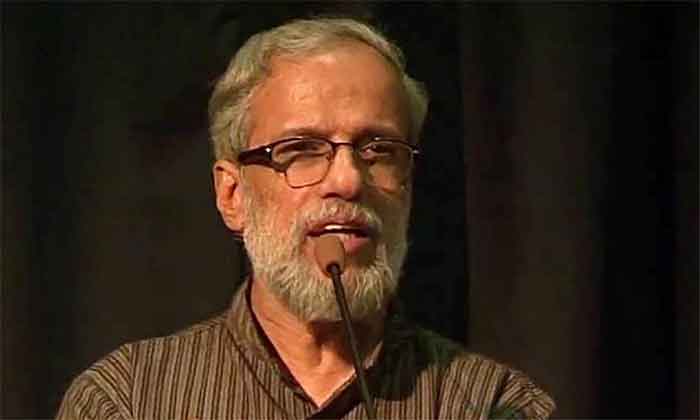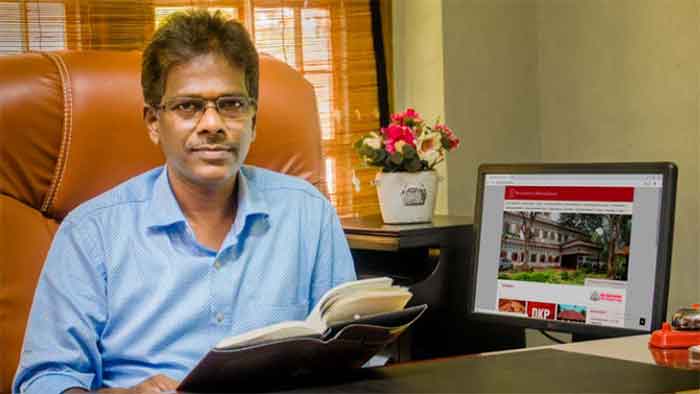SEW-L Inaugural Address
Can historians avoid anachronism in their narratives of the past? This has been a major question in the debates of/in historiography, and noted historian Prof. Rajan Gurukkal addressed this question in the context of the project of ‘reinventing nation’ in historical writings in a fortnightly “Scholars of Eminence Web-Lectures” (SEW-L) organised by the Inter University Centre for Social Science Research and Extension (IUCSSRE), Mahatma Gandhi University.
SEW-L has been organised in honour of Prof. P. Sanal Mohan, noted historian and the winner of Kairali Lifetime Achievement Award in Social Sciences instituted by the Government of Kerala.

Delivering the inaugural SEW-L on the theme Does Historiography Transcend Anachronism? Prof. Rajan Gurukkal noted that historiography with ‘nation’ as its political consciousness generated a lot of discussions as to how Indian culture evolved. He said that “it has been the general understanding that historians overcome their biases through methodological preoccupations and critical self-reflectivity.” Discussing the “limits to historicising without getting into the trap of anachronism,” Prof Gurukkal pointed out certain inherent dangers in internalising the colonial historiography.
Prof Gurukkal said that “no history is successfully transcending anachronism completely and that is the reason why history is rewritten from time to time.” History naturally becomes “an unending dialogue between the present and the past.” He said that “historians seldom recognise the irrelevance of prefixing ‘nation’ to early history and the consequence of their historical description becoming methodologically flawed.” He, however, noted that in the language of historiography, nation is present and we cannot blame the historians because they were writing with the ignominy of the present created by the colonial exploitation and they were trying to develop self-esteem by getting back in time and talking about the brilliant phase of the nation in the making.”
Gurukkal said that “the term ‘colonisation’ was not even semantically revisited with the political implications, and focussing on the anti-imperialist struggle.” Consequently, “historians automatically internalised the colonial craft of historical writing and colonial historiography tended to become part of the nationalist historians’ narratives.” He further said that “nationalist historiography progressed through the writings of both the coloniser and the colonised as if in a game with the rules set by the coloniser and in the language set by the coloniser.” It also fell in line with the “purpose and meanings postulated by the colonial writers.” “The British writers were proud of the British empire. The historians engaged in anti-imperialist struggle were also talking about history’s past with imperialism, history’s past with colonies, and thereby showing greatness of India with the parameters set by the colonial writers.”
Talking about “aggrandising the nation in various ways at the instance of history,” he said that “maritime trade in the past was boosted as a national self-esteem and it played a decisive role in making the nation-centric historiography absorbing the language of imperialism celebrating the country’s mercantile presence all over the ancient world in the East and the West.” Such writings of historians, flooded with a lot of patriotism, emerged even as they were “not conscious of the fact that even India as nation did not exist during the historical processes that they were focussing on.”
Economic historians also do such mistakes; for instance, in dealing with ‘Indo-Roman’ trade, they don’t even distinguish between trade and exchange relations. But these transactions were all the result of trading communities travelling like pastoralists. But that kind of trade had nothing to do with ‘nation’ as such because ‘nation’ was not present at that stage in history. Nation-centricity in historiography is further reified as state-centricity without knowing the problem of prefixing ‘nation’ and ‘state’ to early history.
According to Prof Gurukkal, “it’s okay if, with the nationalist historiography, the problem of expressions involving semantic ambiguity and anachronism disappear.” But many Indian historians of the colonial period fell into the trap set by the colonisers and their intellectual scheme of things.
He said that “ever since national politico-cultural geography has been the point of reference—commonly used for marking geographical regions—dividing history into convenient units with colonial criteria has been haunting Indian writers.” “Although the identification of regions and their history, based on the national geography, has been quite convenient, none of the identification is intelligible enough to truthfully communicate with the historical reality because the processes and relationships overlap, the nation-centric geography as a whole as well as its parts,” he added.
Prof Sabu Thomas, Vice Chancellor, Mahatma Gandhi University, inaugurated the SEW-L series. The SEW-L sessions, began on 15 April, will continue till 28 April. Prof Dipesh Chakraborty, Lawrence A. Kimpton Distinguished Service Professor, The University of Chicago, United States, will deliver the valedictory address on 28 April 2021.
Speakers of the sessions include Prof. P.K. Michael Tharakan, Chairman, Kerala Council for Historic Research (KCHR), Prof. G. Arunima, Professor, Centre for Women’s Studies, Jawaharlal Nehru University, and Director, Kerala Council for Historical Research (KCHR), Prof. Sundar Sarukkai, Founder of Barefoot Philosophers and visiting faculty at the Centre for Society and Policy, Indian Institute of Science, Bangalore, Prof. Dilip M. Menon, Mellon Chair in Indian Studies and Director, Centre for Indian Studies in Africa, University of the Witwatersrand, Johannesburg, South Africa, Prof. M. Kunhaman, former Professor, Tata Institute of Social Sciences, Mumbai, Prof. Partha Chatterjee, Professor of Anthropology and South Asian studies, Columbia University, United States, Prof. Sasheej Hegde, Professor, Dept. of Sociology, University of Hyderabad, Prof. K. Satyanarayana, Dept. of Cultural Studies, EFLU, Hyderabad, Dr. Sujith Parayil, Associate Professor, School of Social Sciences, MG University, Prof Janaki Nair, former Professor, Centre for Historical Studies, Jawaharlal Nehru University, Prof. Bhangya Bhukya, Professor, Department of History, University of Hyderabad, and Prof. Gopal Guru, Editor, Economic and Political Weekly and Professor, Centre for Political Studies, Jawaharlal Nehru University.
Prof. Udaya Kumar, Centre for English Studies, Jawaharlal Nehru University, Dr. K. George Varghese, President of Deleuze and Guattari Studies in India, Dr. Sreerekha Sathi, Faculty at the International Institute of Social Studies (ISS), Erasmus University Rotterdam, Dr. Suresh Madhavan, Tata Institute of Social Sciences, Dr. A.K. Ramakrishnan, Professor, School of International Studies, Jawaharlal Nehru University, Dr. T.T. Sreekumar, Professor, EFLU, Hyderabad, Prof P.P. Raveendran, former UGC Emeritus Professor, School of Letters, Prof Vineetha Menon, former Head of the Department of Anthropology, Kannur University, Prof. Amruth G. Kumar, Professor of Education, Central University of Kerala, Dr. M.H. Ilias, Dean of Social Sciences, MG University, Dr. Abhilash Babu, Director, School of Social Sciences, MG University, Dr. S. Raju, Associate Professor, School of Social Sciences, MG University and others will chair the SEW-L sessions.
Prof P. Sanal Mohan

Dr. P. Sanal Mohan is a distinguished scholar in Social Sciences whose career spanning over three decades is a testimony of immense dedication and commitment. Dr. Sanal Mohan is stepping down as Professor in Mahatma Gandhi University, Kerala on 30 April 2021 after an accomplished academic life with remarkable achievements. He joined the Faculty of the School of Social Sciences (SSS), Mahatma Gandhi University in 1993 after his stint as a Lecture in History under the University of Calicut. Dr. Sanal is one of the architects of the SSS—an institution with immense contributions in interdisciplinary Social Sciences. Having specialized in Ethnography, Social History, Modernity/Colonial Modernity, Social Movements etc., Dr Sanal established himself as a reputed researcher and teacher in SSS He served as Professor in SSS, besides officiating as Hon. Director of the Inter University Centre for Social Science Research and Extension (IUCSSRE), Mahatma Gandhi University and Director, Kerala Council for Historical Research (KCHR).
Dr Sanal Mohan also has an illustrious international research experience. In 2008, he was a Postdoctoral Fellow in Colonial and Postcolonial Studies at the Department of History and ICIS/RDI Research Fellow, Emory University, Atlanta. He worked as a Fellow in History at the Centre for Studies in Social Sciences, Calcutta, Charles Wallace India Fellow in History, SOAS, University of London. He also served as Honorary Research Associate, Social Anthropology Programme, Massey University, New Zealand, Visiting Faculty Associate, Centre for the Advanced Study of India, University of Pennsylvania, The USA, Fellow, Social Sciences Research Council, New York, Postdoctoral Visiting Fellow Max Planck Institute for the Study of Religious and Ethnic Diversity, Gottingen, Germany, and Smuts Visiting Fellows in Commonwealth Studies, Clare Hall and Centre of South Asian Studies, University of Cambridge.
Dr Sanal Mohan undertook many projects with the support of the Social Sciences Research Council (SSRC), New York, South West India Funded Endangered Archives Programme, The British Library, London, the Indian Council of Social Science Research (ICSSR), New Delhi, IUCSSRE etc.
Dr Sanal Mohan has to credit several books, journal articles, book chapters, monographs, reviews, commentaries, popular articles etc. His publications include Modernity of Slavery: Struggles against Caste Inequality in Colonial Kerala (Oxford University Press, New Delhi 2015), Subalterns and Everyday Life: Social life of Dalit Christians in Manjadikkiri (IUCSSRE/DPP 2021) and several works in English and Malayalam. His papers and articles have appeared in Economic and Political Weekly, Journal of South Asian Studies, South Asia Research, Journal of Religious and Political Practice, Studies in Humanities and Social Sciences, and Journal of Agrarian Change, Cambridge Journal of Anthropology. Dr. Sanal’s book chapters have appeared in volumes published by Palgrave Macmillan, Routledge, Duke University Press, Sage, Oxford University Press, Penguin Books etc.
The author is Director, Inter University Centre for Social Science Research and Extension (IUCSSRE), Mahatma Gandhi University, Kerala. He also served as Dean of Social Sciences and Professor of International Relations and Politics, Mahatma Gandhi University. He can be contacted at [email protected]
GET COUNTERCURRENTS DAILY NEWSLETTER STRAIGHT TO YOUR INBOX










































